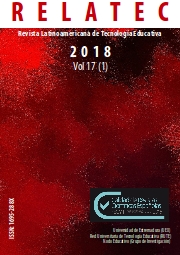ICT and education: neutrality or pedagogical policies? An approach from the Paulo Freire's Pedagogy
DOI:
https://doi.org/10.17398/1695-288X.17.1.91Keywords:
ICT, Pedagogy, Open Source Software, Communication, InformationAbstract
The paper aims to address the incorporation of technologies of communication and information (ICT) in the field of education in the Latin American context. The purpose is to discuss the naive conception of ICT that understands them like politically-pedagogically neutral. We will use the theoretical framework of the pedagogy of liberation elaborated by Paulo Freire. This theoretical framework points out that education is always a political fact: we educated to form a kind of citizen and for a kind of society. The article raises four discussions of high political-pedagogical content about ICT: free software vs. proprietary software (or copyrigths vs. copyleft); web peer to peer vs. web server/customer-user; free and secure information and communication vs. mass espionage; knowledge community vs. neocoloniality of knowledge. Finally we argue in favor of the paradigm in ICT that we consider pedagogical, ethical and technically more appropriate for the field of education especially in the countries of the Latin American context.
Downloads
References
Argentina, Consejo Federal de Educación (2016). Declaración de Purmamarca. Recuperado de: http://educacion.gob.ar/data_storage/file/documents/declaracion-de-purmamarca-58af36ecea19d.pdf
Bauman, Z; Lyon, D.,(2013) Vigilancia Líquida, Buenos Aires: Paidos.
Brasil, Ministerio de educación (2016) Base Nacional Común Curricular. Recuperado de:
http://movimentopelabase.org.br/wp-content/uploads/2016/05/BNCC-BOOK-WEB.pdf
Bourdieu, P; Passeron, J.C, (1977), La Reproducción. Elementos para una teoría del sistema de enseñanza, Barcelona: Laia.
Freire, P. (1988) La educación para una transformación radical de la sociedad, en Una educación para el desarrollo: la animación sociocultural, 13-24. Madrid: Fundación Banco Exterior.
Freire, P. (1970) Pedagogía del Oprimido. Montevideo: Nueva Tierra.
Foucault, M. (2000) Vigilar y Castigar. México: Siglo Veintiuno.
Greenwald, G (2014), Snowden, sin un lugar donde esconderse. Mexico: Ediciones B.
Greenwald; Marquis-Boire; Lee, (2015) XKEYSCORE, en The Intercept. Recuperado de: https://theintercept.com/2015/07/01/nsas-google-worlds-private-communications/
Heinz, F. (2006). ¿Qué tiene que ver Software Libre con educación?.En Prohibido Pensar, Propiedad Privada, Fundación
Heinrich Böll. Recuperado de: https://www.vialibre.org.ar/wp-content/uploads/2006/11/prohibidopensarpropiedadprivada.pdf
Iacomela, F; Marodias, A. (2012) “Educación Libre y Abierta. Dimensiones y construcciones”, en Ciberespacio y Resistencia, Lago Martínez, S. (comp.). Buenos Aires: Helks.
Kleiner, Dmytri, (2017), Manifiesto Telecomunista. Buenos Aires: SL.
Magnani, E. (2014) Tensión en la Red. Libertad y Control en la era digital. Buenos Aires: Autoría.
Autor (Año) Título.
Mogle, Eben (2011) Por qué la libertad política depende de la libertad del software más que nunca, En Defensa del Sofware Libre, Nº 1 01/02/2011. Recuperado de : https://endefensadelsl.org/por_que_la_libertad_politica.html
Swartz, Aaron (2012) Manifiesto por la guerrilla de Acceso Abierto, En Defensa del Sofware Libre, Nº 1 19/11/2012. Recuperado de :https://endefensadelsl.org/guerrilla_del_acceso_abierto.html
UNESCO. (2016). UNESCO. Recuperado de Las TIC en educación: http://www.unesco.org/new/es/unesco/themes/icts/
Downloads
Published
Issue
Section
License
Authors who publish in this journal accept the following conditions:
1. The Author retains copyright in the article. Upon acceptance of the article, the author shall grant to the Publisher the right of first publication of the article. with the dcoument registered with the Creative Commons Attribution-NonCommercial-NoDerivative 4.0 International (CC BY-NC-ND) license, which allows to third parties to use what is published whenever they mention the authorship of the work and the first publication in this journal.
2. Authors can make other independent and additional contractual agreements for the non-exclusive distribution of the article published in this journal (eg, include it in an institutional repository or publish it in a book) provided they clearly indicate that the work was published for the first time in this journal.
3. Authors are allowed and recommended to publish their work on the Internet (for example on institutional or personal pages) before and during the review and publication process, as it can lead to productive exchanges and a greater and faster diffusion of published work (see The Effect of Open Access).









